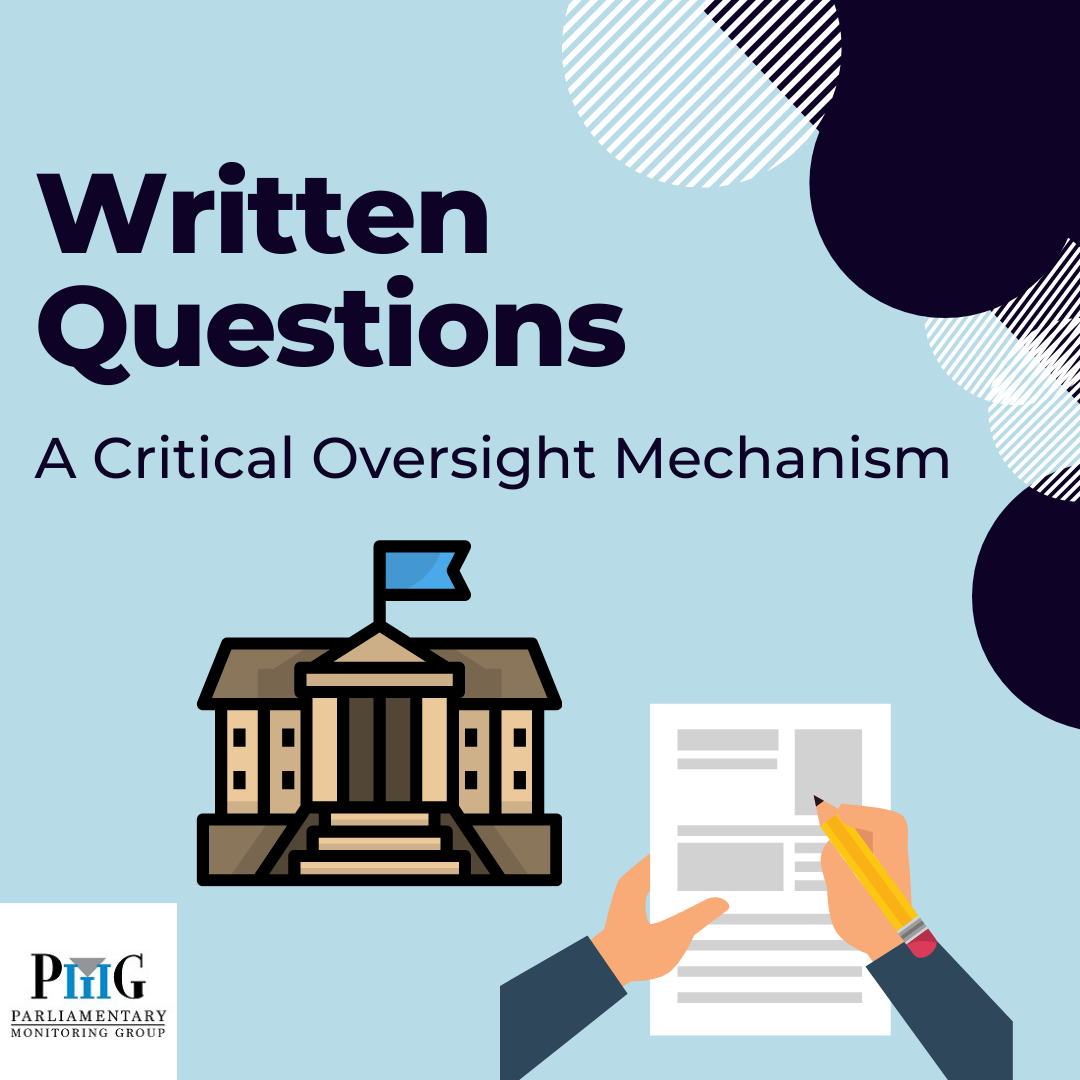Written Questions: A Critical Oversight Mechanism

Written Questions & Replies have been a long established feature of parliamentary democracies. They form part of a motley of critical oversight mechanisms and play a crucial role in holding the Executive accountable.
Legislators in many countries are able to table written questions – providing the relevant Minister the opportunity to have the issue researched by staff and an answer subsequently provided in writing. Answers are also recorded in the published parliamentary proceedings.
Check the PMG tool for Ministerial Questions and Replies
https://pmg.org.za/question_replies/
Questions for written answer are used by Members of Parliament to extract more detailed information from the Government than would be practical in an oral answer, try to expose policy or implementation failures or to press for action.
Research shows that in all parliaments opposition parties are more active in asking questions than governing parties. MPs from the governing party tend to use informal means to obtain information or bring government attention to issues due to their close relation to the government.
In many legislatures, written questions are now more frequently used than oral questions. A notable exception is the United States Congress which lacks the mechanism of written questions, a familiar part of parliamentary procedures in other countries. In one study of parliamentary questions in the European Union, it was found that written questions have been the most popular form of questioning. This is due to the tight restrictions placed on another notable oversight mechanism; oral questions, which must be submitted by a parliamentary party group, a committee or a minimum number of MPs.
A total of 18 823 written questions were posed to the Executive over the Fifth Parliament - 74.5% of these questions were asked by the DA alone followed by 14.6% by the EFF. Only 0.73% of the questions were posed by the ANC
In South Africa, the procedures governing questions are set out in both the Rules of the National Assembly and Rules of the National Council of Provinces. The Rules prescribe the format and stipulate that Questions for written reply are limited to three questions per Member per week; and must be replied to within 10 working days, provided that the responsible Minister may in writing request the Speaker for an extension not exceeding a further 10 working days on good cause shown.
Recently, Parliament released a document on the Status of Questions and Replies in 2020. Of the 3097 questions asked by MPs, 6% were not replied to and 71% were late replies. The departments which were asked the most questions were: Police (272), Health (248), Basic Education (226), and Social Development (174); with the bulk of questions from MPs relating to government’s COVID-19 pandemic response. The following departments did not provide replies to more than 10% of the questions asked by MPs: Defence & Military Veterans (28%), Transport (23%), Justice & Correctional Services (17%), Cooperative Governance & Traditional Affairs (17%), and Police (13%).
Flowing from these statistics as presented, during a subsequent meeting NAPC meeting, opposition MPs expressed concern about the non-responsiveness as well as late submission of replies by Ministers. It was pointed out that a handful of Ministers seemed to be always late in providing their written responses. It has also been observed that even when government departments do provide input, they use semantics to avoid answering questions. “There was also a problem of procedural compliance where Ministers give inadequate responses. Therefore, Parliament should come up with a robust mechanism to ensure substantive compliance as some of the responses sent to Parliament were not helpful to MPs,” said UDM MP Nqabayomzi Kwankwa. In the ensuing discussion, it was suggested that this matter be taken up to the Deputy President as leader of government business. The entire system of Questions and Replies needed to be looked into as it has significant implications for the oversight work of MPs.
Previously, the Fifth Parliament had agreed to establish a Rules of the National Assembly subcommittee to address failure by the Executive to reply to questions. The mechanism envisaged was to be chaired by the Deputy Speaker to hold Ministers to account. However, the matter was never scheduled for consideration by the House at that time. With MPs calling for the revival of this proposal, it is still to be seen how soon the subcommittee is established so that the Sixth Parliament fully exercises its authority and ability of recourse. Additionally, there is a recommendation to the Speaker that Ministers whose replies have not been forthcoming be named before the House during plenary sittings. The President might also have to be called on to enter the fray and urge Ministers to submit their replies to Parliament timeously.
About this blog

"That week in Parliament" is a series of blog posts in which the important Parliamentary events of the week are discussed.
We host the latest posts of this blog, written by People's Assembly. You can find more on PA's blog.
About this blog

"That week in Parliament" is a series of blog posts in which the important Parliamentary events of the week are discussed.
We host the latest posts of this blog, written by People's Assembly. You can find more on PA's blog.
